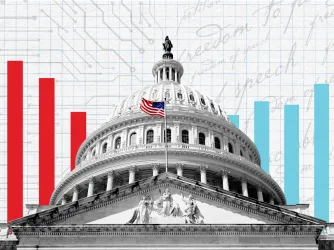Table of Contents
College students defend speech and incitement — when it benefits them

THOMAS BENDER / HERALD-TRIBUNE / USA TODAY NETWORK
A protester spits on New College of Florida trustee Christopher Rufo during a campus visit on July 13, 2023.
College students are the closest thing we have to free speech absolutists in this country.
That’s a potential takeaway from a new Axios Voices survey of college students, conducted by The Harris Poll. The poll finds that almost two-thirds of college students say that free speech protections should extend to physical threats and incitement to violence.
That’s pretty hardcore — and it’s not pro-free speech.
True threats and incitement to violence are not protected by the First Amendment for a reason: They have the effect of chilling speech, making people afraid to voice their opinions. And the idea that students are pro-free speech in general is truly shocking, considering it contradicts most of the survey data on college student attitudes toward free speech that’s been collected over the past decade.
In other words, these findings do not pass the smell test. Here’s why.
A decade of data shows students are not in favor of free speech
Survey data collected over the past decade overwhelmingly indicates that college students are not ardent supporters of free speech. In fact, many college students:
- Are opposed to allowing many different controversial speakers on campus.
- Think that colleges should be able to restrict the use of language offensive to certain groups and the ability of students to wear costumes that stereotype certain groups.
- Favor the establishment of safe spaces on campus so that students can be free from exposure to the threatening ideas, conversations, or actions.
- Say that it is acceptable for their peers to shout down a speaker in order to prevent them from talking.
- Agree that physical violence can be justified to prevent a person from espousing “hate speech” or making racially charged comments.
Since 2014, college students have also increasingly called for banning speakers from campus or firing scholars for expression that they consider “offensive,” “hateful,” or “violent.”
So what can explain why a majority of college students now say they want to push the boundaries of free speech — beyond even what the First Amendment protects?
Nothing makes you more pro-free speech than being silenced
One issue where FIRE is seeing this dynamic play out is the debate over the Israel-Palestine conflict. Since the October 7 attacks on Israel, and subsequent war in Gaza, multiple pro-Palestinian events have been canceled across the country. Students on multiple campuses have been investigated, threatened with expulsion, or even arrested for pro-Palestinian speech. Multiple schools have suspended their recognition of the student organization Students for Justice in Palestine. Some have placed the organization on probation for their expression, and some have outright banned it. Republicans in the House of Representatives have pressured the Department of Justice to investigate SJP for ties to terrorist organizations, and state governors have attempted to ban chapters of SJP altogether from state colleges and universities.
The true test of one’s principles isn’t upholding them when it’s beneficial to oneself, but when it’s uncomfortable and difficult.
In general, college students and people ages 18 to 29 feel more favorably toward the Palestinians and are more critical of Israel than their older counterparts. For instance, in FIRE’s pilot sample of 1,086 undergraduates for this year’s upcoming College Free Speech Rankings, we asked students if a speaker who has said, “From the river to the sea, Palestine will be free,” should be allowed on their campus. More than two-thirds of students (69%) said “probably” or “definitely.” However, when asked about whether a speaker who has said, “Collateral damage in Gaza is justified for the sake of Israeli security,” should be allowed on campus, only 35% said “probably” or “definitely.”
In other words, it seems like college students suddenly favor First Amendment protections for speech — and more — because a number of them feel like their own voices are being silenced on campus.
This could also explain why they’re much more tolerant of some viewpoints than others.
Free speech for me, but not for thee.
Since October 7, pro-Palestinian students and student groups have been involved in a number of deplatforming attempts targeting Israeli speakers or pro-Israel speech. These include pulling a fire alarm during a talk by English author Ian Haworth at the University of Kentucky; shouting down Congressman Daniel Kurtzer at the University of Washington, professor Asaf Peer at the University of Nevada, Las Vegas, and university President Christina Paxson at Brown University; and unsuccessfully disrupting a discussion between journalists Bari Weiss and Frank Bruni at the University of North Carolina Chapel Hill.

OUTRAGEOUS: SFSU students shout down Riley Gaines and accost her after event
Former NCAA swimmer Riley Gaines was invited to campus by Turning Point USA to talk about gender and sports but was met by an angry crowd chanting and screaming at her to leave.
Rather than principled free speech enthusiasts, most college students are like most of their older counterparts — they believe in free speech for themselves, but not for those with whom they disagree.
Further, the fact that some students think that physical threats and incitement to violence are acceptable isn’t something to celebrate. Students with a healthy respect for free speech principles would not endorse these illiberal, speech-chilling tactics.
Unfortunately, context and convenience make fairweather free speech fans of most people. The true test of one’s principles isn’t upholding them when it’s beneficial to oneself, but when it’s uncomfortable and difficult.
Given the reams of data FIRE has collected over the last decade, it’s unlikely that these new survey results reveal anything other than the fact that the old “free speech for me, but not for thee” sentiment continues to thrive on college campuses. But, we can hope that students who have their own expressive rights trampled today may come to recognize the importance of defending freedom of speech, even for the speech they hate.
Recent Articles
Get the latest free speech news and analysis from FIRE.

FIRE POLL: Americans overwhelmingly want free speech protected in AI regulation

LAWSUIT: FIRE sues Federal Trade Commission over agency’s targeting of news rating service

TICKETS ON SALE: Step up to the Soapbox in Philadelphia, Nov. 4-6, 2026


